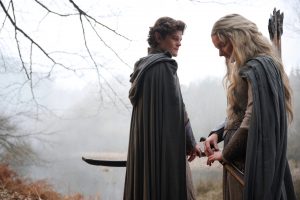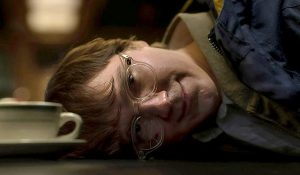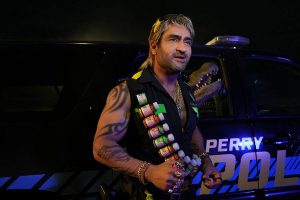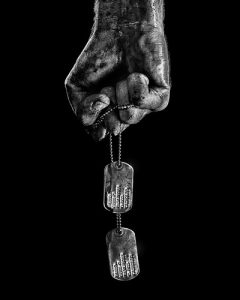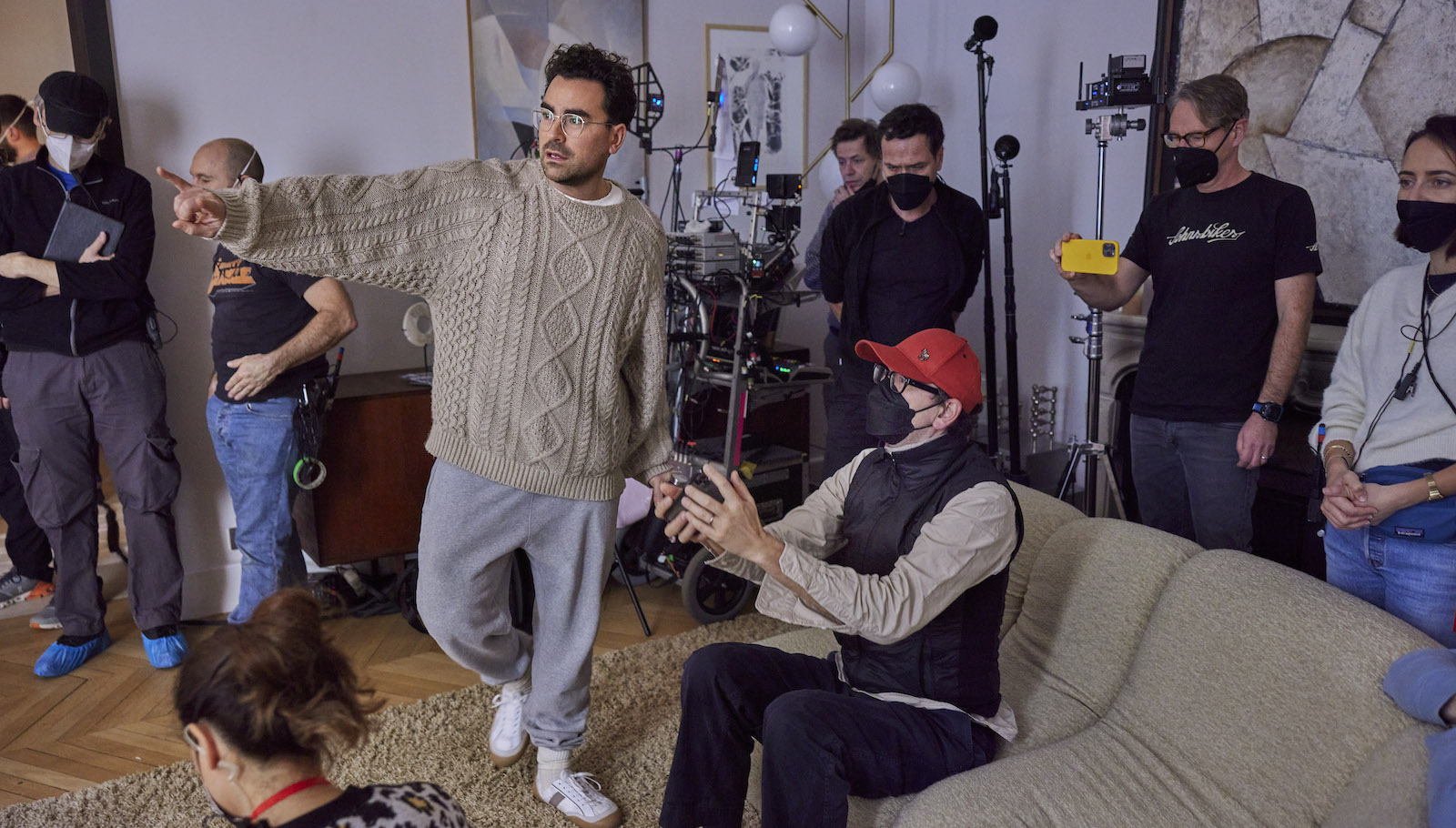
This article contains some Good Grief spoilers.
For the entirety of Good Grief, I couldn’t look away from Dan Levy’s sweater: that excellent cable-knit style popularized in recent films like Knives Out, yet here in a lovely dove gray unlike the usual preppy cream. It was also radically different from the black-and-white jumpers he modeled as David Rose in the dramedy Schitt’s Creek, establishing that queer character’s distinctive fashion sense in a uniform that would recur even with his emotional development. Yet it feels like a costuming through-line to Levy’s next memorable character, widower Marcus, in his feature debut as a writer-director.
Here the sweater signifies the very human desperation to hold on to something of the past, even when it brings us pain. As Marc learns through his own figurative unraveling after a year of grief, a memento like that doesn’t have to be discarded in order to move on.
In the film, Levy’s Marcus is widowed suddenly and brutally when his beloved, charismatic husband Oliver (Luke Evans) leaves their annual Christmas party early for a book signing, only for his taxi to get T-boned a stone’s throw from their London home. Despite the idyllic soirée that jumpstarts the movie, it’s immediately clear Marc is a part of his husband’s life and not the other way around. A former painter, Marc abandoned that artform after his mother’s death and the beginning of his partnership with bestselling author Oliver. That Marc has channeled his talent into illustrating Oliver’s wildly popular Victoria Valentine fantasy YA book series is only partially fulfilling, but it has allowed him a gorgeous lifestyle. Now with Oliver gone though, everything has changed. And nothing has changed.
To wit, Marc sleepwalks through the first year without Oliver, wearing the accouterments of their charmed life like a shroud, down to occasional meetings with their lawyer and financial advisor Imelda (Celia Imrie). As lonely as he is, he is never alone; his two best friends, ex-lover Thomas (Himesh Patel) and hot mess Sophie (Ruth Negga), are constantly present to keep him company on long nights watching The Real Housewives of New York City and to distract from their own dating woes.
But when Marc makes an attempt at closure by finally opening Oliver’s Christmas card from the year before, he discovers that his husband was jetting to Paris not just for his fans, but for a new lover. Worse yet, their rendezvous was a secret apartment that Oliver had never told his own husband about. With the lease ending within the month, Marc invites Sophie (freshly single), and Thomas (forever unlucky in romance) to the City of Love ostensibly as a thank-you for carrying him through his first year as a widower, but really because he can’t bear to explore Oliver’s hidden life alone.
Good Grief was initially announced as a romantic comedy, though it quickly became clear this is much more of a dramedy, with less of a focus on romance than the love between friends and found family. The latter was Levy’s real emotional core, as he recently told Entertainment Weekly. It also creates a clear segue from his work on Schitt’s Creek. While the Rose clan had to overcome their filial baggage from their lavish lifestyle in New York City on that beloved sitcom, Marc’s individual dynamics with Sophie and Thomas more bring to mind how David and motel owner Stevie Budd’s (Emily Hampshire) relationship evolved from friends-with-benefits to platonic soulmates, even as David found true love with Patrick Brewer (Noah Reid).
In fact, Good Grief reveals that 15 years prior, Thomas and Marc had one year of fraught happiness (including five months of cohabitation) before realizing how bad they were for each other as boyfriends and so much better off as best friends. It was also Sophie who brought them together, and who would come to lean on them for the intervening decade and a half. The ways in which these people find each other are messy, punctuated with hurt and scars, but they’ve clearly grown past their younger selves and into late-thirties semi-functioning adulthood.
Except, they’re not done growing, and they’ve all got time left to confront what’s not working in their lives. While the supporting characters can come off as a bit one-note at times, their dynamics are authentically lived-in, from Negga playing Sophie’s desperate need to be the life of the party, even when no one wants her to, to Patel bringing some of his moodiness and aimlessness from Station Eleven to the trio’s perennially single character, who finds himself more and more shouldering the role of caretaker during his friends’ respective crises.
But before things can get too maudlin, Levy deftly handles the ongoing tonal shifts between the absurdity of life-after-death. Marc’s withholding of the truth behind their Gay Paree trip nods to the screwball misunderstandings often present in rom-coms, which is reflected in Levy’s overall handling of this thorny story. The movie is plotted with the kind of witty dark humor that withholds key pieces of information, or confrontations, until the moment at which they will be the punchiest—like when Oliver’s young lover Luca (Mehdi Baki) appears at their love nest at the worst possible time. As bittersweet as his time in Paris is, it also reminds Marc of the entire world outside of his and Oliver’s flat; he connects with a charming yet truth-seeking Frenchman named Theo (Arnaud Valois), who in turn reinvigorates his long-dormant artistic inspiration.
There are some story threads I would have liked to see tugged on a bit more. At the start of the film, Marc’s clear comfort and passivity in his life is so established as to be unquestionable, and there seems to be enough money left in Oliver’s estate that it doesn’t change his financial situation for an entire year. Though Thomas calling Marc a spoiled brat during a heated exchange feels somewhat out of line for what he’s experienced up to that point, he’s also not wrong; the movie just doesn’t challenge that privilege and complacency the way that Schitt’s Creek did with each of the Roses.
What’s more, it’s never made clear what brought the American artist Marc to London in the first place—every other important person in his life is from there—and whether he would ever leave. It was only after reading the aforementioned EW interview with Levy, who lives in London, that it became clear that the city saved him from a bad relationship in his 20s. It’s a fun detail to know after the fact, but might have been woven in better.
What does come through is Levy’s personal connection to his screenplay, having lost both his grandmother and his dog since the start of the COVID-19 pandemic. The movie features two big speeches about grief—most notably between Marc and Celia—that stand out like statement pieces in a wardrobe. It’s fitting that those two characters, each standing on one metaphorical shore looking toward or away from loss, inhabit both scenes. As Levy told Vogue, he wrote them as conversations with himself, ultimately arriving at some sort of answers.
To come back to the sweater, Levy wisely does not tie up every loose end in Good Grief. Oliver is not absolved in death, even as a late-stage conversation recontextualizes exactly what he meant in his final letter. Nor does his beloved book series get resolved by a ghostwriter or even, as I briefly wondered, Marc himself. His mostly young, female readers are left without an ending, as is his starlet Lily Kayne (Kaitlyn Dever in an inappropriately out-of-touch funeral cameo), who was banking on an entire film franchise to sustain her career.
But there’s always fanfiction; there’s always reinvention; there’s always the choice to put a period on a sentence instead of letting it fade away into ellipses. It’s all good grief because it forces us to exercise our brains and bodies in new and unexpected, yet still healing, ways.
Good Grief is streaming on Netflix.
The post Good Grief: Dan Levy Brings Big Emotions and Excellent Sweaters to Directorial Debut appeared first on Den of Geek.



